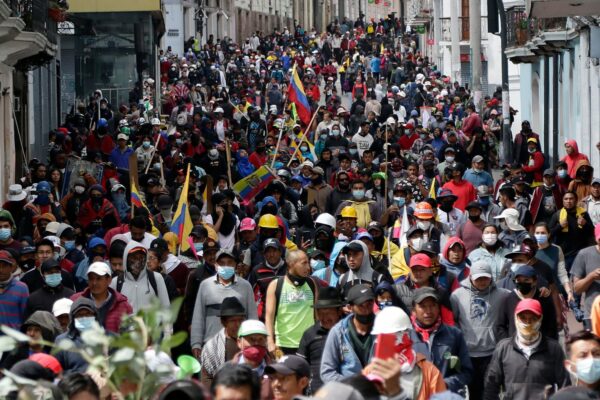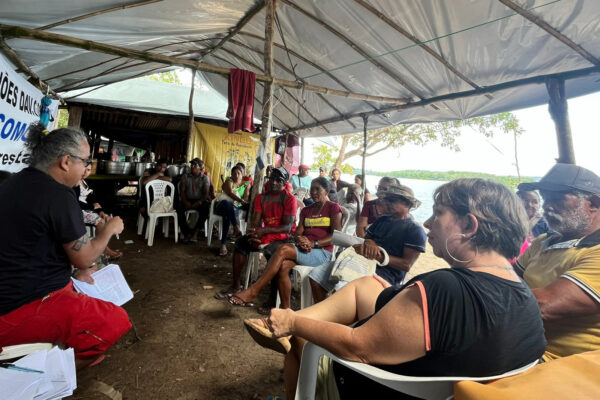San Francisco, CA – On the heels of World Biodiversity Day (May 22) and in connection to an upcoming panel on the Amazon at Davos on May 25, tipping point scientists, Indigenous leaders, and international organizations are calling on banks and financial institutions that have gathered for the World Economic Forum in Davos to end financing for oil expansion in the Amazon.
This call for action follows the recent commitment by BNP Paribas to end financing for oil and gas in the Amazon and action earlier in the year by ING – first movers on Amazon oil policy for the rest of the industry to follow.
This message was also to be uplifted and reinforced on a panel by Dr. Carlos Nobre on May 25th at 10:15 am CEST during a Davos sponsored panel. Dr. Nobre is a renowned Brazilian scientist who has been modeling the tipping point in the Amazon and his perspective is represented below. (However he is no longer presenting at Davos in person due to COVID)
Dr. Nobre says: “It is important to uplift the recent commitment of BNP Paribas to end new financing for oil and gas in the Amazon. This is consistent with both what the IEA is calling for and what the Indigenous federations and the Amazonia for Life: Protect 80% by 2025 coalition and Exit Amazon Oil and Gas platforms are all calling for. Given that Davos is such a big gathering of banks, it is important to draw attention to this because oil expansion is a gateway to deforestation and also has significant impacts on the land, water, and people of the Amazon.”
Ending financing for new oil development in the Amazon is consistent with the IEA calls for no new oil and gas expansion globally, and is also relevant for this moment in time given the Russian oil ban and increased pressure on oil reserves in the Amazon.
José Gregorio Díaz Mirabal, General Coordinator of the Coordinating Body of the Indigenous Organizations of the Amazon Basin (COICA) says:
“Thanks to the worldview and stewardship of indigenous peoples, the largest tropical forest on the planet has persisted for millennia. If any less than 80% of the rainforest is lost, it will convert from being the world’s largest carbon sink to one of its largest savannahs, releasing tonnes of carbon into the atmosphere in the process. A commitment to end financing and investment for oil and gas in the rainforest is a vital step for banks to make in order to avert this point of no return. An Amazon Exclusion policy will also uphold the rights of indigenous peoples, support greater climate stability, and avoid further disasters and contamination inherent to oil development.”
The Amazon is in the midst of a tipping point crisis and science has shown that 80% of the Amazon needs protection by 2025 as reflected in passage of IUCN Motion 129 with the support of over 500 international organizations and 60 foreign ministries from more than 30 countries. In a declaration from Amazonian Indigenous federations calling for 80% protection by 2025 and the creation of Amazon Emergency Action plans, an end to the expansion of oil, mining, agriculture, and other drivers that are further fragmenting the Amazon, the financial sector is singled out to “ensure respect for the rights of Indigenous peoples and an end to deforestation throughout financed supply chains.”
With six European banks making varying degrees of commitments to end or restrict financing for oil and gas in the Amazon (BNP Paribas, ING, Credit-Suisse, Natixis, Societe Generale, and Intesa), a trend is emerging within the banking sector and shows that European banks are taking this issue seriously while U.S. banks are completely silent and lack adequate policies to effectively address this exposure. This movement in the sector is consistent with the principles outlined in the Exit Amazon Oil and Gas platform.
A closer look at Ecuador – a top oil export nation in the Western Amazon that is exporting ⅔ of its oil to the United States and primarily California – shows what’s at stake. Ecuador’s president Lasso is planning to double oil production which would put 3 million hectares (7.5 million acres) of roadless rainforest at risk of being auctioned off for new oil concessions; this is opposed by all seven Indigenous nationalities whose territories overlap with the oil blocks. It is possible that the financing that would enable this expansion will come from the very banks that are attending the World Economic Forum annual meeting in Davos.
Citibank has played a key role in the build out of the oil industry in Ecuador and is being singled out for the major role that it has played in funding oil in the Amazon as a whole. as was highlighted in April during its AGM. with the publication of the Citigroup Amazon Oil Exposure report by Stand.earth and Amazon Watch that was accompanied by protesters on the streets in New York. In the report, Citi’s legacy role as a major funder of the build-out of the oil industry in Ecuador and more broadly is chronicled in detail. A new case study with testimony from Indigenous leaders was also recently released and is calling on Citibank to put a policy in place similar to its Arctic oil commitment to end financing for oil and gas in the Amazon.
Nemo Andy Guiquita, a Waorani Indigenous leader and Women and Health Coordinator of Confederation of Indigenous Nationalities of the Ecuadorian Amazon (CONFENIAE) says:
“Oil drilling in our Amazon has brought contamination, disease, deforestation, destruction of our cultures, and the colonization of our territories. It is an existential threat for us and violates our fundamental rights as Indigenous peoples. We are calling for an end to all new extraction on our lands, and as our ancestors and science now affirm, we must keep fossil fuels in the ground, in accordance with the commitments of the Paris Agreement and at COP 26 in Glasgow,”
Tyson Miller, Amazon Campaigns Director, Stand.earth says:
“It is time for the financial institutions that have been bankrolling oil in the Amazon to truly align with the spirit of their environmental and social policies and what the world needs now and commit to end financing for oil development in the Amazon – starting with an immediate end for oil expansion in this critical region. Dozens of banks have Arctic oil exclusions and need to make the same commitment for the Amazon. Opaqueness is complicity on this issue and BNP Paribas’ clear leadership on this issue shows what is possible.”
Pendle Marshall-Hallmark, Climate & Finance Campaigner, Amazon Watch says:
“Global banks leaders at Davos and beyond must wake up to the reality that the fossil fuel industry is a terrible financial investment, linked not only to climate chaos and environmental devastation but also gross human rights violations. Frontline communities have long borne the brunt of global banks’ history of support for the Amazon oil and gas industry, so the recent commitment from BNP Paribas to an Amazon Exclusion policy is promising. There is an urgent need for more banks to follow suit.”
About the Exit Amazon Oil and Gas Campaign
The Exit Amazon Oil and Gas campaign, led by Stand.earth and Amazon Watch and in collaboration with the Amazonian Indigenous Federation of Ecuador, CONFENIAE, and the Pan-Amazonian Indigenous Organization, COICA, is calling on banks to commit to excluding financing for oil and gas in the Amazon.
The campaign follows research completed by Stand.earth and Amazon Watch that exposes links between leading banks in the Global North and the Amazon oil and gas trade. An August 2020 report resulted in several major European banks committing to end financing for the trade of new oil from Ecuador and some have since extended commitments into Peru. That investigation was followed by a scorecard report titled Banking on Amazon Destruction, revealing the ways that not only top European, but also top U.S. banks, remain highly exposed to the risks of Indigenous rights violations, environmental degradation, corruption, and other harms due to their ongoing relationships with oil companies and traders operating in the Amazon rainforest.
The Exit Amazon Oil and Gas campaign also addresses one of the strategies in the Amazonia For Life: Protect 80% by 2025 initiative led by Indigenous communities calling for the permanent protection of the rainforest.
Learn more at exitamazonoilandgas.org













